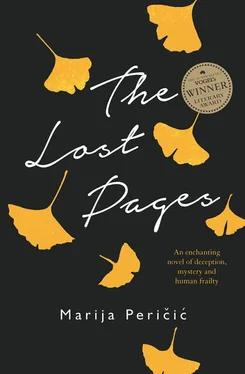Marija Peričić

FOR SCHOLARS OF KAFKA, THE NEWS OF THE FORTHCOMING release of the Kafka papers raised the tantalising prospect, however unlikely, of an undiscovered novel by the great author. The trial leading to the release of the papers was initiated principally by the Israeli National Library, whom I assisted, against the Hoffe/Wiesler sisters. The sisters’ possession of the papers has kept them from public view since Max Brod supposedly handed the papers to the mother of the Hoffe/Wiesler sisters in the 1960s, and the trial has once again focused the international spotlight on the legacy of Kafka. Hopes of a lost work were dashed, however, by the release of a documents list during the discovery stage of proceedings: the Kafka papers consist only of short notes, drawings and a memoir—the latter not by Kafka but by Brod. Yet this memoir of Brod’s was for me a more exciting prospect still.
Franz Kafka is undoubtedly the most important figure in modern German-language literature, but the survival of his work is only due to the lesser-known Brod. As the story goes, when Kafka lay in bed dying of tuberculosis, his friend Brod at his bedside, his last words were, ‘Burn all my work—everything—and spare none of it.’ Thankfully, Brod defied the instruction. At that time, only a few of Kafka’s short stories, including ‘The Metamorphosis’, had been published and this only with Brod’s help.
Brod did much to establish Kafka’s place in the literary firmament, promoting his young protégé as he sought out publishers, and editing his work, especially after Kafka’s death. Kafka’s posthumously published work includes such literary marvels as The Trial , The Castle and Amerika . Many of these works were finished by Brod’s own hand, and certainly none escaped his influence.
If Brod was so central to the emergence of the towering literary heavyweight that Kafka would become, then the nature of the man to whom this great task fell is naturally of some curiosity. Those tempted to associate Kafka with his characters—the self-loathing, insect-like figure of ‘The Metamorphosis’ or the tortured soul in ‘A Hunger Artist’—might be surprised by his contemporaries’ description of a confident, charming, cheerful and handsome young man. In reality, Brod was the one who struggled with crippling anxieties, and chronic psychological and physical difficulties.
While Brod’s novels and, to a lesser extent, his musical compositions achieved popularity and acclaim in his lifetime, they are of comparatively little interest today. And this is one of many reasons that the public release of Brod’s memoirs from the contested Kafka papers should be tantalising. The question on my mind as I await the prospect of reading them is not so much what more they reveal of Kafka, for we already know much about him, but what they will tell us about the man behind him; the man striving to cultivate the talent he must have known would one day completely eclipse his own.
Professor Wendell Persson University of Kent
THE PAGES THAT APPEAR HERE HAVE BEEN TRANSLATED FROM THE German. They come from a series of notes handwritten in exercise books, which also contain a number of loose sheets of notepaper, photographs and other documents, which together, make up Max Brod’s memoirs. The material is in fair condition, considering its age, although there are some areas of illegibility due to water damage and ageing of the paper. Some sections of the papers are also presented in nearly illegible handwriting. Areas where approximations have been made are indicated in the text.
The translation and verification process of these papers has been a slow one to date, partly due to the poor quality of some of the documents in the archive and their disorganisation. This section represents the first coherent manuscript from the collection that has been translated, and will shortly be available for online access—as will, in time, the rest of the Kafka papers.
I STILL REMEMBER THE FIRST TIME I SAW FRANZ; A DAY THAT seems now either the beginning of or the beginning of the end of my life’s misfortune. It was October, when the days are still bright and sharp, and Prague was just beginning to fall into the quiet embrace of autumn. At that time I was writing a book about Schopenhauer, and I was to give a lecture on the subject. I had studied Schopenhauer since my university days and, although I am no authority on the man and his theories, I certainly know more about him than most. The lecture room where the talk was to take place was small but crowded, and the shuffling of bodies and the scratching of pens on paper formed a constant accompaniment to my voice.
I had hardly been speaking ten minutes when a voiced sang out from somewhere at the back of the crowd.
‘You idiot!’
The outburst caused me to pause momentarily. I had just mentioned in passing Schopenhauer’s assertion that this world was the worst of all possible worlds, since a worse world could not continue to exist—an idea with which I happen to agree, its flaws nothwithstanding. I decided to ignore the man and push on with my lecture. Perhaps I had misheard.
But I had not. After a moment he called out again.
‘What a load of shit. Any fool can argue against that.’
The heckler was blocked from my view, but his voice was young and self-important. People began shifting in their seats and craning their necks to look at him. I had given many lectures and talks, but this had never happened to me before and I did not know what to do. Was it better to ignore the heckler and continue, or to answer him? I stood, hesitating. By now the heckler had taken the attention of a good part of the room, which from my perspective had transformed from rows of faces to rows of head-backs and collars.
His voice came once more.
‘You are a fool if you truly believe that. There is an infinite number of possible worlds that are worse than this.’
I cleared my throat. ‘Well,’ I began, ‘problems do exist with—’
‘Consider yourself personally,’ he interrupted.
He stood up and I saw him for the first time. He was of a slight build, dark and handsome in a somewhat delicate way. His handsomeness surprised and angered me.
He went on, ‘I could name a thousand things that could be changed about the world that would make the world worse for you, and it would still continue to exist. You could lose your voice, for example.’
There were a few scattered laughs from the audience. I ignored them.
‘But of course Schopenhauer is not referring to individuals; greater human existence is his theme,’ I said.
‘It is merely an example,’ he said. ‘There could be incremental changes in any condition in the world—choose any one!—and still we would go on. Things can always be a little worse.’
He sat down again, seeming to be satisfied with having voiced his disagreement. I struggled to appear composed, and wavered between countering him, which I felt compelled to do, or ignoring him, which I knew was the more dignified approach. His face peered out from the crowd, goading me, but I resolutely turned my eyes back to my page of notes. For the rest of the lecture, the heckler limited himself to snorts and noisy sighs, but I had nevertheless lost the attention of most of the room. Each of the heckler’s percussive snorts would trigger a chorus of smiles and whispers in the crowd, and by the time I had reached the end of my talk I felt that he had certainly made the world of my evening worse than it could have been.
Читать дальше














